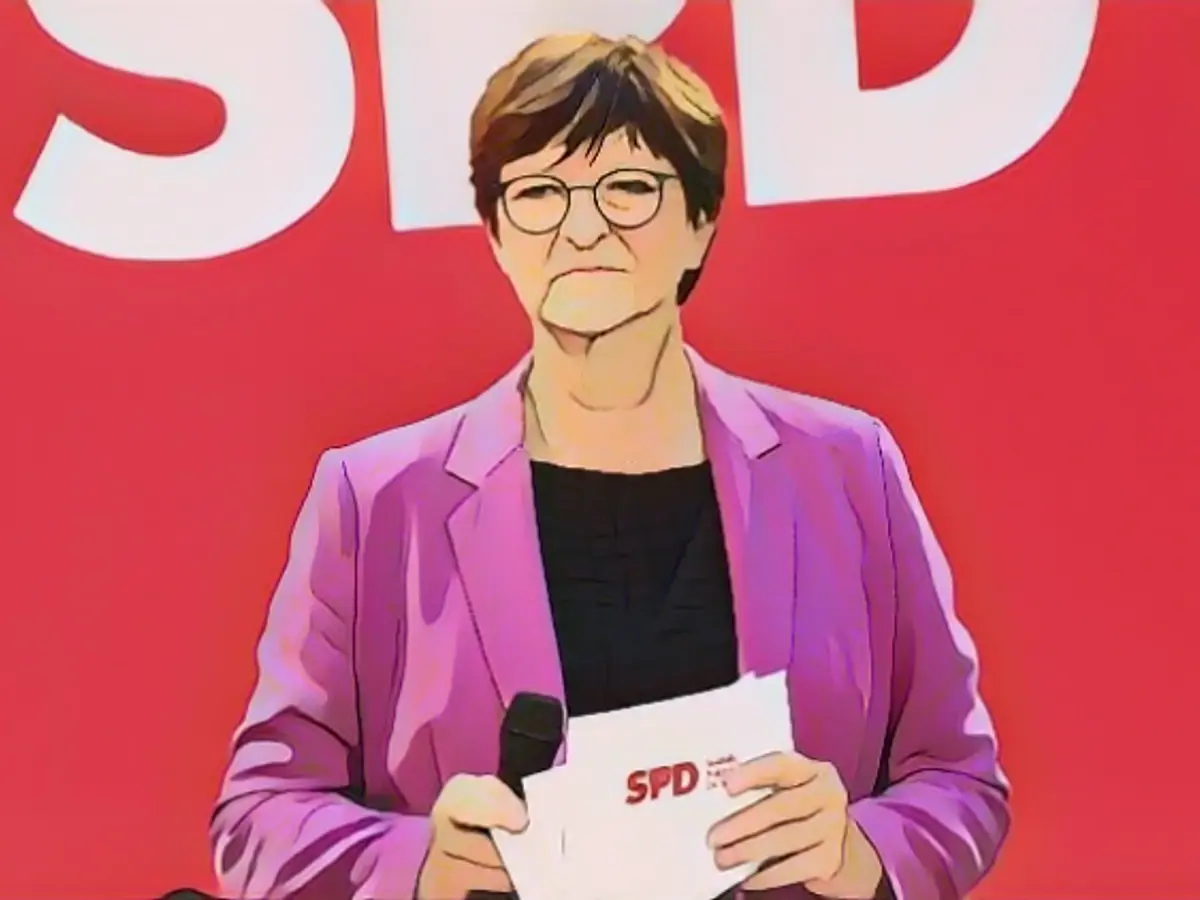Esken: "It was clear to everyone that this was a trick"
After the ruling in Karlsruhe, things are getting tight for the traffic lights. How is the 17 billion euro hole now to be plugged? ntv head of politics Blome speaks of a government crisis on Markus Lanz. SPD party leader Esken does not see this and surprises with a statement.
SPD party leader Saskia Esken does not have it easy. On the ZDF talk show Markus Lanz on Tuesday evening, she is to explain how the ruling by the Federal Constitutional Court in Karlsruhe, which is causing the federal government so many headaches, came about. After all, the traffic light government has to cope with a budget deficit of 17 billion euros. Federal Chancellor Olaf Scholz, Economics Minister Robert Habeck and Finance Minister Christian Lindner have now been sitting together for several days to discuss the matter. Scholz and the Social Democrats actually wanted to have the issue off the table for the time being by the end of the year, but this is unlikely to happen. At least the cabinet will not be discussing the federal budget this Wednesday. Next week, the Bundestag will meet regularly for the last time this year. It is extremely unlikely that parliament will then deal with the 2024 budget.
Markus Lanz has invited three guests to discuss the federal budget with him in the first half of his show. ntv and RTL head of politics Nikolaus Blome speaks of a government crisis, but Esken and the finance minister's economic advisor Lars Feld see things differently. The government had rededicated coronavirus aid that the economy had not drawn down into a transformation fund. "It was clear to everyone that this was a trick," says Esken.
Last Thursday, the politician spoke of a trick on the ZDF talk show Maybrit Illner. Lanz now wants to know how it really was and whether the government had played a trick. He does not succeed in eliciting this one word from Esken, although he makes an almost intrusive effort. Nikolaus Blome supports him when he criticizes: Half of the experts had warned the federal government about this move. "They knew it was at least 50 percent risky. You can do that if you're a good player and have good nerves. But this government doesn't have good nerves, nor should you bet everything you have on this 50 percent chance. And all you have is this government, and it stands or falls on that thing. And that was a bit of a gamble."
A little later, Blome added: "It was a magic trick to reconcile everything that you failed to reconcile in your coalition negotiations." The coalition wanted to ensure that the coalition parties could push through their favorite projects without raising taxes.
"You might as well say it is a further development of the budgetary practice that has evolved over the last twenty years," says economist Lars Feld. He doesn't want to talk about trickery either. Instead, he explains the practice of the federal and state governments of creating special funds or shadow budgets in a way that is not easy to understand.
Feld criticizes investments
In its ruling in mid-November, the Federal Constitutional Court declared the replenishment of the Climate and Transformation Fund (KTF) with unused loans from the coronavirus pandemic to be unlawful. Among other things, this fund was intended to provide money for companies such as Intel that wanted to relocate to eastern Germany. Economist Lars Feld now says on Lanz: "I wouldn't invest in Intel, nor would I pay these huge sums to the old industries to make it easier for them to transition to climate change." Steel, for example, can be imported, he says, and we don't have to produce it ourselves. "We live in an economy with a high division of labor. We are not self-sufficient in any other way. We can get it from abroad."
Esken does not agree with this, saying that this would make Germany dependent on other countries. "Until now, for example, we were dependent on cheap energy from Russia." In future, we would be dependent on other countries if we needed cheap steel. And she cites another example: "Investing in the semiconductor industry in Europe, so that it sets up here in Germany, is an investment in our independence." Esken also points to supply chains that were interrupted during the coronavirus crisis, for example. Blome also points out: "You have to realize that globalization is no longer running as smoothly as it did five years ago." He can therefore understand why a German government is now pursuing an industrial policy that would have been considered old-fashioned twenty years ago.
However, Feld also mentions another point which, in his opinion, speaks against government support for the establishment of further foreign companies in Germany: demographic change. "It's completely backwards to say that we have to subsidize jobs here and there for the sake of it." If 3,000 jobs were created at the chip manufacturer Intel, these workers would be missing elsewhere, says Feld.
Esken is not convinced by this. She calls for "the industrial core in Germany to be preserved and for us to ensure that we do not become dependent on supply chains like we were."
Read also:
- Year of climate records: extreme is the new normal
- Precautionary arrests show Islamist terror threat
- Numerous oil, gas and coal lobbyists at climate conference
- COP28: Emirates announce fund for climate projects
Saskia Esken will discuss the impact of the Karlsruhe ruling on the traffic light coalition's budget deficit on Markus Lanz's ZDF talk show. Despite ntv's Blome's claims of a government crisis, Esken maintains her position on the matter and disagrees with Markus Lanz's suggestions of trickery in the government's budget practices.
Source: www.ntv.de








